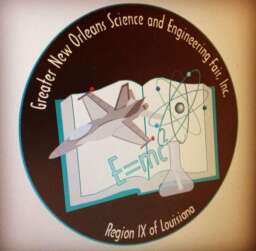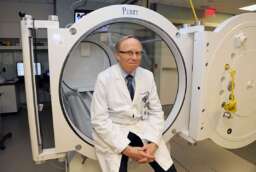Science & Medicine
Welcome! Here, we feature exciting things happening in the fields of Medicine and Science. Check out the scientific discoveries of our grant recipients and our friends!
-
 Posted on:We at the Brown Foundation developed our 2019 Oncology Program through a pilot program we ran at Tulane in 2018 at the laboratory of Victoria P. Belancio, PhD. In December of 2019 we issued another award in the amount of $100,000 to support the revolutionary science occurring at the Tulane Center for Aging in Dr. Belancio’s laboratory, bringing our total support for her efforts to alleviate human suffering to $337,900. Dr. Belancio’s primary research interests are focused on genetic instability and cellular responses associated with the activity of mammalian retroelements. She is studying molecular mechanisms controlling the expression of and the damage from these elements in normal and cancer cells. She is broadly recognized for her original contributions to understanding the impact of retrotransposons on genome stability and disease and her first major discovery involved identification of novel mechanisms attenuating expression and damage caused by LINE-1 retrotransposon. Further information about the groundbreaking work of Victoria P. Belancio, PhD. may be found here.
Posted on:We at the Brown Foundation developed our 2019 Oncology Program through a pilot program we ran at Tulane in 2018 at the laboratory of Victoria P. Belancio, PhD. In December of 2019 we issued another award in the amount of $100,000 to support the revolutionary science occurring at the Tulane Center for Aging in Dr. Belancio’s laboratory, bringing our total support for her efforts to alleviate human suffering to $337,900. Dr. Belancio’s primary research interests are focused on genetic instability and cellular responses associated with the activity of mammalian retroelements. She is studying molecular mechanisms controlling the expression of and the damage from these elements in normal and cancer cells. She is broadly recognized for her original contributions to understanding the impact of retrotransposons on genome stability and disease and her first major discovery involved identification of novel mechanisms attenuating expression and damage caused by LINE-1 retrotransposon. Further information about the groundbreaking work of Victoria P. Belancio, PhD. may be found here.
-
 Posted on:The Brown Foundation is proud to announce the winner of the $100,000 grant designated for the Salk Institute - an invited participant to our 2019 Oncology Program - is the Regulatory Biology Laboratory with Dannielle Engle, PhD. as the principal investigator. Dr. Engle’s proposal to epigenetically intercept CA19-9 for the treatment of pancreatic cancer is potentially nothing short of revolutionary. Dr. Engle’s work builds upon the finding that pancreatic cancer cells use different sugars than normal pancreatic cells. She will test whether interference with metabolic pathways governing the production of these sugars will weaken the cancer cells without impacting the healthy cells. This work also considers the financial burden of a cancer diagnosis by pursuing drugs that are already FDA-approved and are also now available as generics, reducing their cost by 5- to 10-fold. Dr. Engle’s hypothesis is that preventing the elevation of CA19-9 will shut down the malignant cascade and trigger cell death in the cancer cells. More Information.
Posted on:The Brown Foundation is proud to announce the winner of the $100,000 grant designated for the Salk Institute - an invited participant to our 2019 Oncology Program - is the Regulatory Biology Laboratory with Dannielle Engle, PhD. as the principal investigator. Dr. Engle’s proposal to epigenetically intercept CA19-9 for the treatment of pancreatic cancer is potentially nothing short of revolutionary. Dr. Engle’s work builds upon the finding that pancreatic cancer cells use different sugars than normal pancreatic cells. She will test whether interference with metabolic pathways governing the production of these sugars will weaken the cancer cells without impacting the healthy cells. This work also considers the financial burden of a cancer diagnosis by pursuing drugs that are already FDA-approved and are also now available as generics, reducing their cost by 5- to 10-fold. Dr. Engle’s hypothesis is that preventing the elevation of CA19-9 will shut down the malignant cascade and trigger cell death in the cancer cells. More Information.
-
 Posted on:The Brown Foundation is proud to announce the winner of the $100,000 grant designated for the University of Mississippi - an invited participant to our 2019 Oncology Program - is the laboratory of Dr. Pier Paolo Claudio. His laboratory’s main utilization of the $100,000 grant from the Foundation will be to further his work in assessing the therapeutic efficiency of the tumor suppressor gene p53 expressed by a human replication-deficient-adenoviruses or a conditionally replicative human oncolytic-adenovirus, delivered by ultrasound-targeted microbubble destruction (UTMD), in conjunction with radiation therapy (RT). Dr. Claudio hypothesizes that MBs will target the delivery of RDAds and OVs expressing p53 to human PC cells grafted in immune-deficient NOD Rag gamma mice (NRG), and that MBs/hOVs will induce a greater tumor reduction in conjunction with radiation therapy in comparison to the MB/hRADs. Learn more about the sophisticated research of Dr. Claudio here.
Posted on:The Brown Foundation is proud to announce the winner of the $100,000 grant designated for the University of Mississippi - an invited participant to our 2019 Oncology Program - is the laboratory of Dr. Pier Paolo Claudio. His laboratory’s main utilization of the $100,000 grant from the Foundation will be to further his work in assessing the therapeutic efficiency of the tumor suppressor gene p53 expressed by a human replication-deficient-adenoviruses or a conditionally replicative human oncolytic-adenovirus, delivered by ultrasound-targeted microbubble destruction (UTMD), in conjunction with radiation therapy (RT). Dr. Claudio hypothesizes that MBs will target the delivery of RDAds and OVs expressing p53 to human PC cells grafted in immune-deficient NOD Rag gamma mice (NRG), and that MBs/hOVs will induce a greater tumor reduction in conjunction with radiation therapy in comparison to the MB/hRADs. Learn more about the sophisticated research of Dr. Claudio here.
-
 Posted on:The Brown Foundation is proud to announce the winner of the $100,000 grant designated for the University of Florida Health Cancer Center - an invited participant to our 2019 Oncology Program - is the laboratory of Catherine T. Flores, PhD. Dr. Flores joined the University of Florida faculty to become part of the Preston A. Wells Jr. Center for Brain Tumor Therapy in order to focus on developing novel approaches to target brain tumors. She has developed a pre-clinical platform that utilizes tumor-specific autologous immune cells to efficiently target intracranial tumors. Her research interests are primarily in determining biological interactions between various cellular compartments involved in adoptive immunotherapy. Her studies also focus on leveraging systemic toxicity of frequently practiced clinical treatments in order to further enhance anti-tumor efficacy of immunotherapy. Further information about the incredible work of Catherine Flores, PhD can be found here.
Posted on:The Brown Foundation is proud to announce the winner of the $100,000 grant designated for the University of Florida Health Cancer Center - an invited participant to our 2019 Oncology Program - is the laboratory of Catherine T. Flores, PhD. Dr. Flores joined the University of Florida faculty to become part of the Preston A. Wells Jr. Center for Brain Tumor Therapy in order to focus on developing novel approaches to target brain tumors. She has developed a pre-clinical platform that utilizes tumor-specific autologous immune cells to efficiently target intracranial tumors. Her research interests are primarily in determining biological interactions between various cellular compartments involved in adoptive immunotherapy. Her studies also focus on leveraging systemic toxicity of frequently practiced clinical treatments in order to further enhance anti-tumor efficacy of immunotherapy. Further information about the incredible work of Catherine Flores, PhD can be found here.
-
 Posted on:The Brown Foundation is proud to announce the winner of the $100,000 grant designated for the Dana-Farber Cancer Institute - an invited participant to our 2019 Oncology Program - is the laboratory of Irene Ghobrial, MD for her groundbreaking work in the study of Multiple Myeloma (MM). MM is a plasma cell cancer that is almost always preceded by the precursor states of monoclonal gammopathy of undetermined significance (MGUS) and smoldering multiple myeloma (SMM). Improvements to non-invasive detection technologies are needed to monitor MM disease progression in order to provide early therapeutic interventions for these patients. Dr. Ghobrial proposes an integrative and powerful blood biopsy approach for early-stage/minimal tumor detection to monitor disease progression in patients with precursor MGUS and SMM. Further information about the incredible work of Irene Ghobrial, MD can be found here.
Posted on:The Brown Foundation is proud to announce the winner of the $100,000 grant designated for the Dana-Farber Cancer Institute - an invited participant to our 2019 Oncology Program - is the laboratory of Irene Ghobrial, MD for her groundbreaking work in the study of Multiple Myeloma (MM). MM is a plasma cell cancer that is almost always preceded by the precursor states of monoclonal gammopathy of undetermined significance (MGUS) and smoldering multiple myeloma (SMM). Improvements to non-invasive detection technologies are needed to monitor MM disease progression in order to provide early therapeutic interventions for these patients. Dr. Ghobrial proposes an integrative and powerful blood biopsy approach for early-stage/minimal tumor detection to monitor disease progression in patients with precursor MGUS and SMM. Further information about the incredible work of Irene Ghobrial, MD can be found here.
-
 Posted on:The Brown Foundation is proud to announce the winner of the $100,000 grant designated for Memorial Sloan Kettering Cancer Center, an invited participant to our 2019 Oncology Program, is The Adrienne Boire Lab. Under the direction of physician-scientist Adrienne A. Boire, this laboratory is on the cutting edge of science with the study of metastasis to the central nervous system. Her laboratory focuses on metastasis to the central nervous system (CNS), both leptomeningeal and parenchymal metastases and she employs multiple complementary approaches to identify and target cancer cell adaptations to the challenging microenvironmental constraints posed by the CNS. The Foundation is honored to issue this award in the amount of $100,000 to further this ground breaking fundamental science. Further information about the incredible work of Adrienne A. Boire, MD, PhD may be found here.
Posted on:The Brown Foundation is proud to announce the winner of the $100,000 grant designated for Memorial Sloan Kettering Cancer Center, an invited participant to our 2019 Oncology Program, is The Adrienne Boire Lab. Under the direction of physician-scientist Adrienne A. Boire, this laboratory is on the cutting edge of science with the study of metastasis to the central nervous system. Her laboratory focuses on metastasis to the central nervous system (CNS), both leptomeningeal and parenchymal metastases and she employs multiple complementary approaches to identify and target cancer cell adaptations to the challenging microenvironmental constraints posed by the CNS. The Foundation is honored to issue this award in the amount of $100,000 to further this ground breaking fundamental science. Further information about the incredible work of Adrienne A. Boire, MD, PhD may be found here.
-
 Posted on:The Brown Foundation is proud to announce the winner of the $100,000 grant designated for LSU - an invited participant to our 2019 Oncology Program - is the sophisticated work of Harry J. Gould III, M.D., Ph.D. (photo’d) and Dennis Paul, Ph.D. Dr. Gould & Dr. Paul’s work is to activate sodium channels while pharmacologically blocking sodium pumps. They believe they can selectively kill cancer cells, bacteria and inflamed neurons. In the presence of disease or injury, basic cellular mechanisms that are usually beneficial for cell function can become detrimental to an organism’s survival. Current approaches for treating cancer and disease focus on eliminating the offending agent in the hope that normal functioning will return. Dr. Gould & Dr. Paul propose a different approach to treating the altered cells: to use the way in which they differ from normal cells then to cause their destruction without damaging the normal cells. This is a paradigm shift from conventional methods for treating cancer that the Brown Foundation is truly honored to have the opportunity to support.
Posted on:The Brown Foundation is proud to announce the winner of the $100,000 grant designated for LSU - an invited participant to our 2019 Oncology Program - is the sophisticated work of Harry J. Gould III, M.D., Ph.D. (photo’d) and Dennis Paul, Ph.D. Dr. Gould & Dr. Paul’s work is to activate sodium channels while pharmacologically blocking sodium pumps. They believe they can selectively kill cancer cells, bacteria and inflamed neurons. In the presence of disease or injury, basic cellular mechanisms that are usually beneficial for cell function can become detrimental to an organism’s survival. Current approaches for treating cancer and disease focus on eliminating the offending agent in the hope that normal functioning will return. Dr. Gould & Dr. Paul propose a different approach to treating the altered cells: to use the way in which they differ from normal cells then to cause their destruction without damaging the normal cells. This is a paradigm shift from conventional methods for treating cancer that the Brown Foundation is truly honored to have the opportunity to support.
-
 Posted on:The Brown Foundation is proud to announce the winner of the $100,000 grant designated for Scripps Research, a participant in our 2019 Oncology Program, is The Brunie Felding Lab. Under the direction of Brunie H. Felding, PhD this laboratory is on the cutting edge of science with a goal of defining and targeting molecular mechanisms that control tumor metastasis. Metastasis is the main cause of death in cancer patients and if dissemination of tumor cells from primary to distant sites could be prevented or blocked after it has occurred, the mortality of patients with solid tumors could be drastically reduced, and cancer would be curable disease. Further information about the incredible work of Brunie H. Felding, PhD may be found here.
Posted on:The Brown Foundation is proud to announce the winner of the $100,000 grant designated for Scripps Research, a participant in our 2019 Oncology Program, is The Brunie Felding Lab. Under the direction of Brunie H. Felding, PhD this laboratory is on the cutting edge of science with a goal of defining and targeting molecular mechanisms that control tumor metastasis. Metastasis is the main cause of death in cancer patients and if dissemination of tumor cells from primary to distant sites could be prevented or blocked after it has occurred, the mortality of patients with solid tumors could be drastically reduced, and cancer would be curable disease. Further information about the incredible work of Brunie H. Felding, PhD may be found here.
-
 Posted on:The Brown Foundation is proud to announce the winner of the $100,000 grant designated for MD Anderson, an invited participant to our 2019 Oncology Program, is the laboratory of Florencia McAllister, MD. Dr. McAllister is a physician-scientist who leads an up and coming basic and translational immunology laboratory with the goal of making discoveries that can result in effective cancer early detection, immunoprevention and immunotherapy. Her lab focuses on understanding the role of the immune system in immunosurveilance and immunoevasion and on dissecting the molecular and cellular mechanisms that regulate the immune responses to tumor initiation and progression with the goal of designing novel effective strategies to prevent and treat cancer. More recently, the laboratory has developed an interest on assessing the role of bacterial products in modulating cancer immune responses. The Foundation is honored to issue the award in the amount of $100,000 to further this ground breaking fundamental science. Further information about the incredible work of Florencia McAllister, MD may be found here.
Posted on:The Brown Foundation is proud to announce the winner of the $100,000 grant designated for MD Anderson, an invited participant to our 2019 Oncology Program, is the laboratory of Florencia McAllister, MD. Dr. McAllister is a physician-scientist who leads an up and coming basic and translational immunology laboratory with the goal of making discoveries that can result in effective cancer early detection, immunoprevention and immunotherapy. Her lab focuses on understanding the role of the immune system in immunosurveilance and immunoevasion and on dissecting the molecular and cellular mechanisms that regulate the immune responses to tumor initiation and progression with the goal of designing novel effective strategies to prevent and treat cancer. More recently, the laboratory has developed an interest on assessing the role of bacterial products in modulating cancer immune responses. The Foundation is honored to issue the award in the amount of $100,000 to further this ground breaking fundamental science. Further information about the incredible work of Florencia McAllister, MD may be found here.
-
 Posted on:Tulane University. Tulane Cancer Center Inroads E-Newsletter. Jonathan Baynham and Tina Bouzon from The Joe W. & Dorothy Dorsett Brown Foundation visit with Dr. Victoria Belancio and Dr. Prescott Deininger, Tulane Cancer Center director and holder of the Joe W. & Dorothy Dorsett Brown Foundation Chair, to learn more about Tulane's program to provide bioinformatics training experiences to female high school students interested in STEM careers.. March 2019
Posted on:Tulane University. Tulane Cancer Center Inroads E-Newsletter. Jonathan Baynham and Tina Bouzon from The Joe W. & Dorothy Dorsett Brown Foundation visit with Dr. Victoria Belancio and Dr. Prescott Deininger, Tulane Cancer Center director and holder of the Joe W. & Dorothy Dorsett Brown Foundation Chair, to learn more about Tulane's program to provide bioinformatics training experiences to female high school students interested in STEM careers.. March 2019
-
 Posted on:Tulane University. Tulane Cancer Center Inroads E-Newsletter. Victoria Belancio, PhD, is exploring "the dark matter of genomes" in an effort to better understand its connection to cancer and other human diseases. March 2019
Posted on:Tulane University. Tulane Cancer Center Inroads E-Newsletter. Victoria Belancio, PhD, is exploring "the dark matter of genomes" in an effort to better understand its connection to cancer and other human diseases. March 2019
-
 Posted on:Jensen, Lynne. "Throw Me Somethin': Science fair draws top metro STEM students." The New Orleans Advocate, Georges Media Group, 23 Feb. 2019, www.theadvocate.com/new_orleans/news/communities/crescent_city/article_812dc434-2994-11e9-a0b4-37ab933bf58f.html.
Posted on:Jensen, Lynne. "Throw Me Somethin': Science fair draws top metro STEM students." The New Orleans Advocate, Georges Media Group, 23 Feb. 2019, www.theadvocate.com/new_orleans/news/communities/crescent_city/article_812dc434-2994-11e9-a0b4-37ab933bf58f.html.
-
 Posted on:"Brown Foundation Latest Rice Stewardship Supporter." Ducks Unlimited , www.ducks.org/conservation/conservation-rice-stewardship/brown-foundation-latest-rice-stewardship-supporter, accessed 5 Dec. 2018.
Posted on:"Brown Foundation Latest Rice Stewardship Supporter." Ducks Unlimited , www.ducks.org/conservation/conservation-rice-stewardship/brown-foundation-latest-rice-stewardship-supporter, accessed 5 Dec. 2018.
-
 Posted on:Tulane Performs Region’s First Case With New Robotic Surgery Technology (August 2018). Retrieved from www.tulanehealthcare.com.
Posted on:Tulane Performs Region’s First Case With New Robotic Surgery Technology (August 2018). Retrieved from www.tulanehealthcare.com.
-
 Posted on:"Salk scientists curb growth of cancer cells by blocking access to key nutrients." Salk News, www.salk.edu/news-release/salk-scientists-curb-growth-cancer-cells-blocking-access-key-nutrients/, 10 Jan. 2018
Posted on:"Salk scientists curb growth of cancer cells by blocking access to key nutrients." Salk News, www.salk.edu/news-release/salk-scientists-curb-growth-cancer-cells-blocking-access-key-nutrients/, 10 Jan. 2018
-
 Posted on:MD Anderson's Therapeutics Discovery drug impairs cancer cells' growth and survival (July 2018). Retrieved from The University of Texas MD Anderson Cancer Center. Visit this page for publication and subscription information.
Posted on:MD Anderson's Therapeutics Discovery drug impairs cancer cells' growth and survival (July 2018). Retrieved from The University of Texas MD Anderson Cancer Center. Visit this page for publication and subscription information.
-
 Posted on:Taking on the Big Five: Salk Takes Aim at Five Deadly Cancers (Spring/Summer 2018 issue) This insideSalk article can be found here.
Posted on:Taking on the Big Five: Salk Takes Aim at Five Deadly Cancers (Spring/Summer 2018 issue) This insideSalk article can be found here.
-
 Posted on:Treatment reverses brain damage weeks after toddler nearly drowned. (July 2017). Retrieved from WDSU News.
Posted on:Treatment reverses brain damage weeks after toddler nearly drowned. (July 2017). Retrieved from WDSU News.



